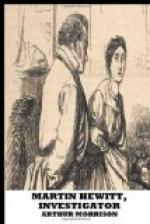Sammy Crockett was undergoing a heavy grooming with white embrocation at the hands of Sergeant Kentish when the landlord returned to Hewitt. “Does Danby know you’ve got him?” he asked. “How did you do it?”
“Danby doesn’t know yet, and with luck he won’t know till he sees Crockett running to-morrow. The man who has sold you is Steggles.”
“Steggles?”
“Steggles it is. At the very first, when Steggles rushed in to report Sammy Crockett missing, I suspected him. You didn’t, I suppose?”
“No. He’s always been considered a straight man, and he looked as startled as anybody.”
“Yes, I must say he acted it very well. But there was something suspicious in his story. What did he say? Crockett had remarked a chilliness, and asked for a sweater, which Steggles went to fetch. Now, just think. You understand these things. Would any trainer who knew his business (as Steggles does) have gone to bring out a sweater for his man to change for his jersey in the open air, at the very time the man was complaining of chilliness? Of course not. He would have taken his man indoors again and let him change there under shelter. Then supposing Steggles had really been surprised at missing Crockett, wouldn’t he have looked about, found the gate open, and told you it was open when he first came in? He said nothing of that—we found the gate open for ourselves. So that from the beginning I had a certain opinion of Steggles.”
“What you say seems pretty plain now, although it didn’t strike me at the time. But, if Steggles was selling us, why couldn’t he have drugged the lad? That would have been a deal simpler.”
“Because Steggles is a good trainer, and has a certain reputation to keep up. It would have done him no good to have had a runner drugged while under his care; certainly it would have cooked his goose with you. It was much the safer thing to connive at kidnapping. That put all the active work into other hands, and left him safe, even if the trick failed. Now, you remember that we traced the prints of Crockett’s spiked shoes to within a couple of yards from the fence, and that there they ceased suddenly?”
“Yes. You said it looked as though he had flown up into the air; and so it did.”
“But I was sure that it was by that gate that Crockett had left, and by no other. He couldn’t have got through the house without being seen, and there was no other way—let alone the evidence of the unbolted gate. Therefore, as the footprints ceased where they did, and were not repeated anywhere in the lane, I knew that he had taken his spiked shoes off—probably changed them for something else, because a runner anxious as to his chances would never risk walking on bare feet, with a chance of cutting them. Ordinary, broad, smooth-soled slippers would leave no impression on the coarse cinders bordering the track, and nothing short of spiked shoes would leave a mark on the hard path in the lane behind. The spike-tracks were leading, not directly toward the door, but in the direction of the fence, when they stopped; somebody had handed, or thrown, the slippers over the fence, and he had changed them on the spot. The enemy had calculated upon the spikes leaving a track in the lane that might lead us in our search, and had arranged accordingly.




